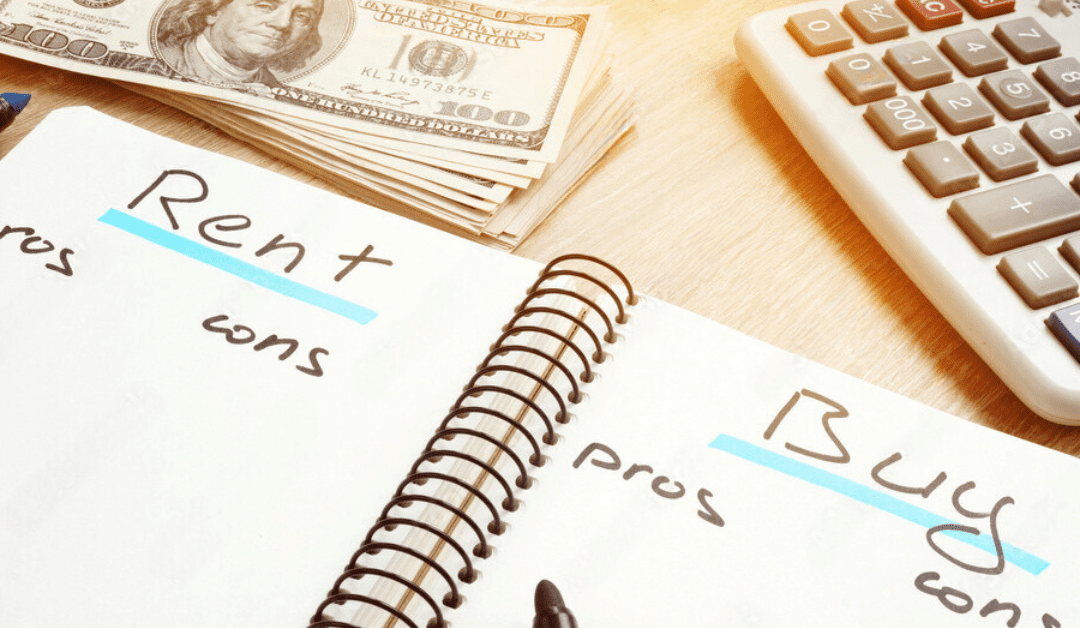Deciding whether to rent or buy a home in 2024? It’s a big choice that depends on your unique situation. At Skye Canyon, we’re here to help you navigate this decision. In this guide, we’ll break down the key factors to consider – from market trends and finances to lifestyle needs.
Let’s explore your options and find the best fit for you!
2024 Housing Market Trends
Moderating Home Prices
After years of steep increases, home price growth is showing signs of moderation. The National Association of Realtors (NAR) reports that the median existing-home price for all housing types in early 2024 was $389,800, up 4.0% from the previous year, indicating a slower pace of appreciation compared to the double-digit growth seen in recent years.
Inventory Improvements
Housing inventory has been gradually increasing, offering some relief to buyers. As of early 2024, total housing inventory stood at 1.09 million units, up 3.5% from the previous year, according to NAR data.
Interest Rate Stabilization
After reaching multi-year highs in 2023, mortgage rates have begun to stabilize. The average 30-year fixed mortgage rate hovers around 6.5% in early 2024, down from peaks above 7% but still significantly higher than the historic lows seen in 2020-2021, as reported by Freddie Mac’s Primary Mortgage Market Survey.
How to Decide Between Renting and Buying-Factors to Consider
Financial Considerations
When deciding whether to rent or buy a home, it’s crucial to understand the full financial picture. Let’s break down the costs and potential benefits associated with each option.
Upfront Costs
For homebuyers, the down payment is often the most significant upfront cost. According to the National Association of Realtors (NAR), the median down payment for first-time homebuyers in 2023 was 8% of the purchase price, while repeat buyers put down an average of 19%. However, down payment requirements can vary:
- Conventional loans: Typically require 3% to 20% down
- FHA loans: As low as 3.5% down for qualified buyers
- VA loans: Can offer 0% down payment for eligible veterans
- USDA loans: Also offer 0% down payment for eligible rural homebuyers
Keep in mind that a lower down payment often means higher monthly mortgage payments and may require private mortgage insurance (PMI).
Closing Costs
Homebuyers should budget for closing costs, which typically range from 2% to 5% of the home’s purchase price. According to ClosingCorp, the average closing costs in 2023 were $6,905 including taxes, or $3,860 excluding taxes. These costs may include:
- Loan origination fees
- Appraisal fees
- Title insurance
- Attorney fees
- Property taxes (prorated)
- Homeowners insurance premiums
Security Deposits for Renting
Renters usually need to provide a security deposit before moving in. The amount can vary, but it’s often equal to one month’s rent. Some landlords may require the first and last month’s rent upfront as well. According to Rent, the median rent in the United States as of January 2024 was $1,964, so a typical security deposit might be around this amount.
Ongoing Costs
- If you buy: You’ll have a mortgage payment. This usually includes:
- Paying back the loan (principal and interest)
- Property taxes
- Home insurance
- If you rent: You pay your rent each month.
Property Taxes and Insurance (For Buyers)
Homeowners need to factor in annual property taxes and homeowners insurance. The average property tax rate in the U.S. is about 1.1% of the home’s value, but this varies widely by state and locality. Additionally, homeowners insurance averages about $2,601 per year, according to data from Insurance.com.
Maintenance and Repairs (For Buyers)
Homeowners should budget for ongoing maintenance and unexpected repairs. A common rule of thumb is to set aside 1% to 4% of your home’s value annually for these costs. For a $300,000 home, that’s $3,000 to $12,000 per year.
Homeowners Association (HOA) Fees (For Some Buyers)
If you buy a property in a community with a Homeowners Association (HOA) you’ll likely need to pay regular fees. While HOA fees can vary widely depending on the community and the amenities offered, they contribute to maintaining shared spaces and services that enhance your living experience.
Benefits of living in an HOA-managed community often include:
- Well-maintained landscaping
- Access to recreational facilities and events
- A higher standard of neighborhood upkeep
Lifestyle Factors
When you’re thinking about whether to rent or buy a home, it’s not just about the money. Your lifestyle and future plans are just as important. Let’s explore why buying a home might be the better choice for you:
Job Stability
- If you buy: A home provides stability and roots, especially if you’re settled in your career or location. Buying allows you to build equity over time. Experts recommend staying in a home for at least 5 years to truly benefit from the investment.
Long-Term Living
- If you buy: Having a home base gives you the security of long-term living. Even if you love to travel or experience new places, owning a home ensures you always have a place to return to without the hassle of renewing leases or moving frequently.
Personalization of Your Space
- If you buy: You have complete freedom to design and upgrade your home as you see fit. Whether it’s remodeling your kitchen or creating a custom outdoor space, these changes can increase the value of your property and make it truly yours.
Outdoor Space
- If you buy: You’re more likely to enjoy your own yard or patio, which you can personalize. Whether it’s gardening, entertaining, or creating a peaceful retreat, outdoor space is an extension of your home and your lifestyle.
Schools and Community
- If you buy: Owning a home allows your family to stay in the same school district, creating consistency for your children and helping you build long-term relationships within the community. You can become part of a stable and supportive neighborhood environment.
Room for Growth
- If you buy: You can choose a home with enough space for your growing family or evolving lifestyle needs. Whether it’s extra bedrooms or space for a home office, buying allows you to plan for the future.
Maintenance and Upkeep
- If you buy: You are in control of your home’s upkeep, ensuring repairs and improvements are done to your standards. While it does take time and investment, it also gives you the opportunity to maintain and even increase your home’s value over the years.
Tax Implications
When deciding between renting and buying a home, it’s important to understand how each option might affect your taxes.
Mortgage Interest Deduction
If you buy a home:
- You can deduct the interest you pay on your mortgage from your taxable income.
- This applies to mortgages up to $750,000 (or $375,000 if married filing separately) for loans taken out after December 15, 2017.
- For loans before that date, the limit is $1 million ($500,000 if married filing separately).
What this means for you: If you pay $10,000 in mortgage interest in a year, you might be able to reduce your taxable income by that amount.
Property Tax Deduction
As a homeowner:
- You can deduct state and local property taxes on your federal tax return.
- There’s a limit of $10,000 per year for all state and local tax deductions combined (including property taxes).
What this means for you: If you pay $5,000 in property taxes, you might be able to reduce your taxable income by that amount, subject to the $10,000 limit.
Capital Gains Exclusion When Selling Your Home
When you sell your primary residence:
- Single filers can exclude up to $250,000 of capital gains from taxes.
- Married couples filing jointly can exclude up to $500,000.
- To qualify, you must have owned and lived in the home as your main residence for at least 2 out of the last 5 years before the sale.
What this means for you: If you buy a home for $300,000 and sell it years later for $500,000, you might not have to pay taxes on that $200,000 profit.
Important Notes:
- To benefit from the mortgage interest and property tax deductions, you need to itemize your deductions instead of taking the standard deduction.
- Recent tax law changes have increased the standard deduction, which means fewer people benefit from itemizing.
- Renters generally don’t receive federal tax deductions related to their housing expenses.
- Tax laws can change, and individual situations vary. For personalized advice, consult with a tax professional.
Remember, while these tax implications are important to consider, they shouldn’t be the sole factor in deciding whether to rent or buy.
Discover Your Dream Home at Skye Canyon
Feeling a bit overwhelmed about whether to rent or buy? Don’t worry!
The goal is to make a decision that feels right for you, both for your wallet and your happiness. Whether you end up renting or buying, knowing you’ve thought it through carefully will give you peace of mind.
If you’re leaning towards buying, consider making Skye Canyon your new home. We offer:
✓ Modern Homes for Every Budget
At Skye Canyon, we provide a variety of thoughtfully designed homes to fit your needs, whether you’re looking for an entry-level home, a spacious family home, or a luxurious estate. Partnering with top builders like Century Communities and Toll Brothers, we ensure every home is crafted with modern design, high-quality materials, and energy-efficient features, offering something for everyone.
✓ World-Class Amenities and Outdoor Spaces
Living at Skye Canyon means embracing an active and outdoor lifestyle. Our nearly 10,000 sq. ft. Skye Fitness facility offers state-of-the-art equipment, a yoga studio, and a Junior Olympic swimming pool. Additionally, the community is surrounded by parks such as the 15-acre Skye Canyon Park, which features basketball courts, soccer fields, splash pads, and walking trails. The extensive trail system and dedicated bike lanes make it easy to stay active while enjoying the beautiful natural surroundings.
✓ A Vibrant, Connected Community
More than just a place to live, Skye Canyon fosters a strong sense of community. With a year-round calendar of events—ranging from fitness classes and seasonal festivals to social gatherings—there’s always something happening. Whether you’re enjoying a coffee at Aspire Coffee House or attending one of our workshops, Skye Canyon is designed to bring neighbors together and create lasting connections.
Ready to see for yourself? Call us today to schedule a tour of Skye Canyon today. Your perfect home could be waiting for you here!

